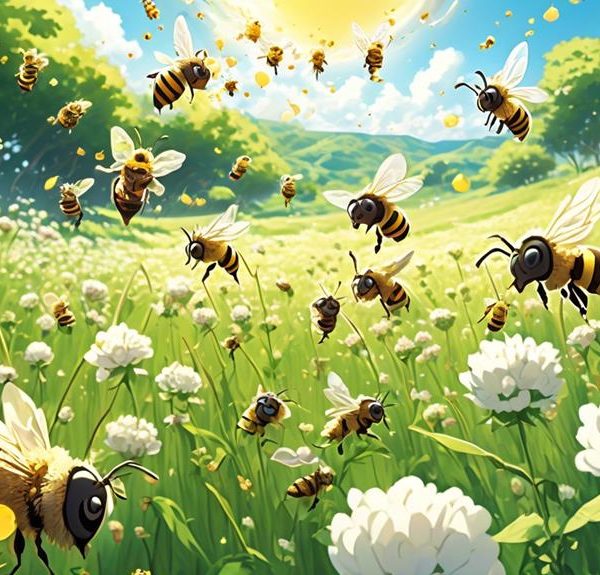Journey into the fascinating world of bees and coconut oil, where answers aren't as straightforward as you might expect.
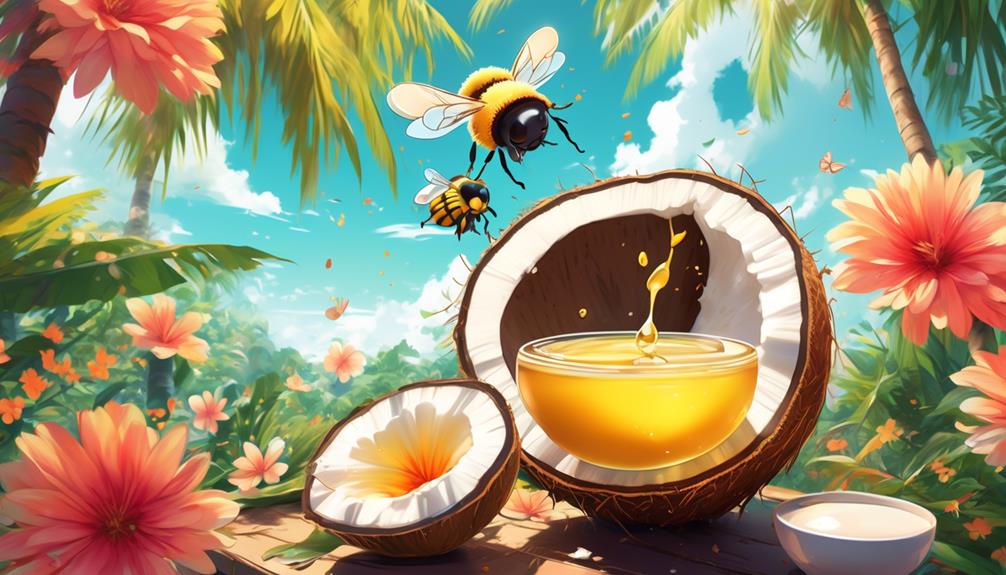
Do Bees Like Coconut Oil?
Just as a bee is drawn to the intoxicating allure of a flower's nectar, you may find yourself intrigued by the unconventional question of whether bees like coconut oil.
You're accustomed to the sight of bees buzzing happily around blossoms, but have you ever considered what would happen if you introduced these industrious little creatures to something as exotic as coconut oil?
The answer isn't as straightforward as you might think. There's a wealth of research and divergent opinions out there, painting a complex picture that may surprise you.
Ready to take this thought-provoking journey into the world of bees and coconut oil? Stay with us, as there's much to uncover.
Key Takeaways
- Bees are selective feeders and do not naturally consume coconut oil as part of their diet.
- Coconut oil does not provide the necessary carbohydrates from nectar or proteins from pollen that bees need for a balanced diet.
- Coconut oil has natural antifungal and antibacterial properties that can protect hives from pathogens.
- Further research is needed to understand the precise effects of coconut oil on bee health and productivity.
Understanding Bees' Dietary Preferences
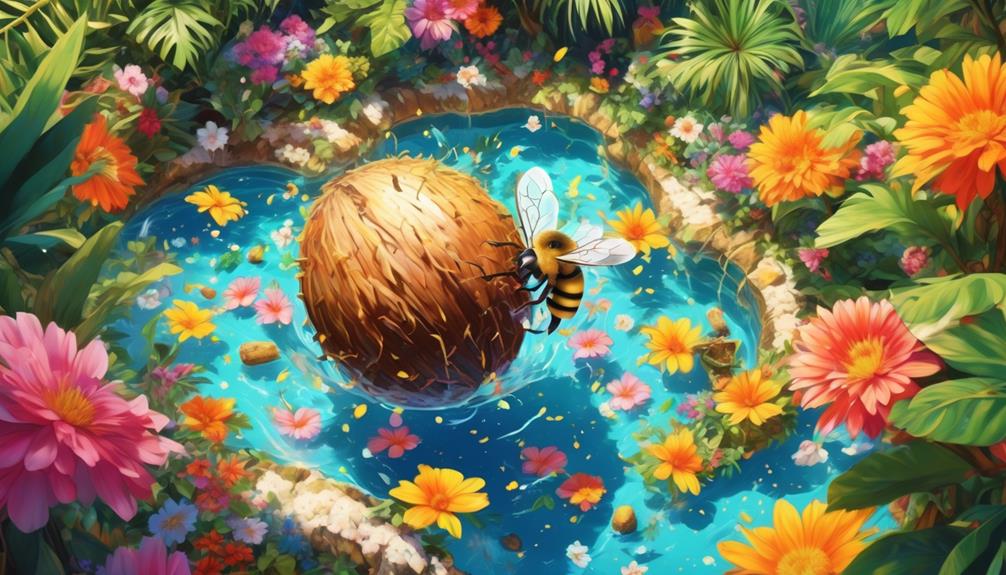
To truly grasp why bees may or may not be attracted to coconut oil, it's crucial to first understand their dietary preferences, which primarily revolve around nectar and pollen from a variety of plants. Bees aren't just indiscriminate feeders. They're selective, opting for plants that deliver the highest nutritional value.
You'll find bees buzzing around flowers laden with nectar, a sweet liquid that provides them with carbohydrates for energy. The pollen, on the other hand, is a source of proteins and fats. It's their bread and butter, so to speak. It's this nutritional balance that they strive to maintain.
Now, you might wonder where coconut oil fits into this equation. Coconut oil, derived from the meat of the coconut, is essentially a fat. It's not a natural part of a bee's diet and doesn't provide the carbohydrates that nectar does. Furthermore, coconut oil lacks the proteins found in pollen.
The Science Behind Coconut Oil
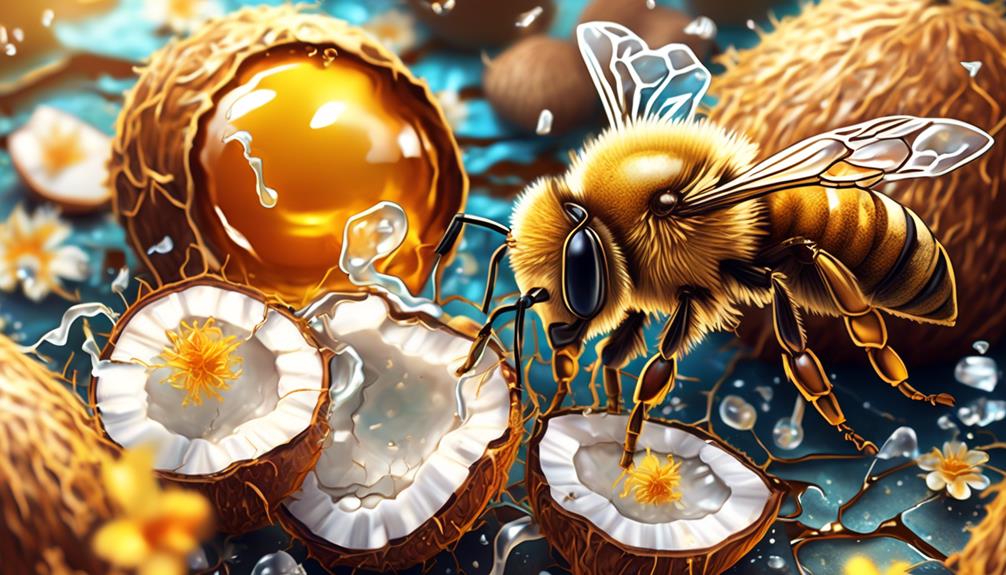
While bees don't naturally consume coconut oil, understanding its composition and properties can shed light on why it may or may not attract them. Coconut oil is predominantly composed of saturated fats, particularly medium-chain triglycerides (MCTs). The primary MCT in coconut oil is lauric acid, making up about half of its total composition.
Aside from MCTs, coconut oil contains trace amounts of vitamins and minerals that bees might find beneficial. However, the oil's molecular structure and consistency could pose challenges for these tiny creatures. The high saturation level makes coconut oil solid at room temperature, a texture that bees aren't accustomed to in their diet.
Moreover, the strong aroma of coconut oil, mostly due to its high lauric acid content, mightn't appeal to bees. Bees are primarily attracted to sweet, nectar-like smells, not the nutty, rich scent of coconut oil.
Coconut Oil in Beekeeping: Pros and Cons
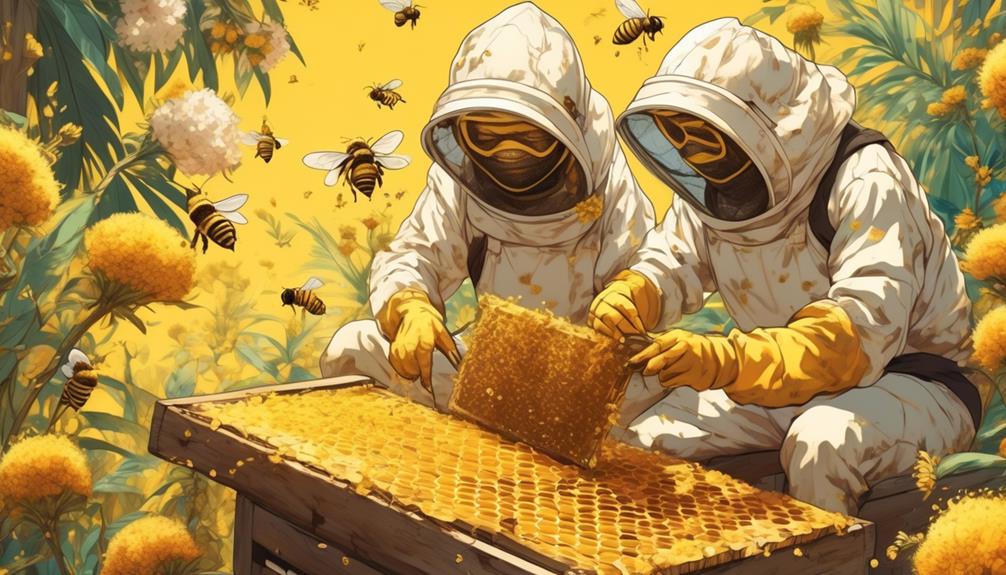
In the realm of beekeeping, the use of coconut oil presents both potential benefits and drawbacks that are worth considering.
On the one hand, coconut oil's natural antifungal and antibacterial properties can help protect your hives from harmful pathogens. It's also a great natural source of nutrition for bees, particularly in the colder months when flowers are scarce.
However, it's not all rosy. The downside of using coconut oil is that it can attract pests like ants and mice, which can be detrimental to your hives. It's also worth noting that bees don't naturally eat coconuts. Thus, while they can derive some nutrition from coconut oil, it doesn't provide them with all the nutrients they need for optimal health.
Furthermore, coconut oil solidifies at lower temperatures, which can make it difficult for bees to consume. This could potentially lead to starvation in colder climates where bees rely heavily on the stored food.
Case Studies: Bees and Coconut Oil
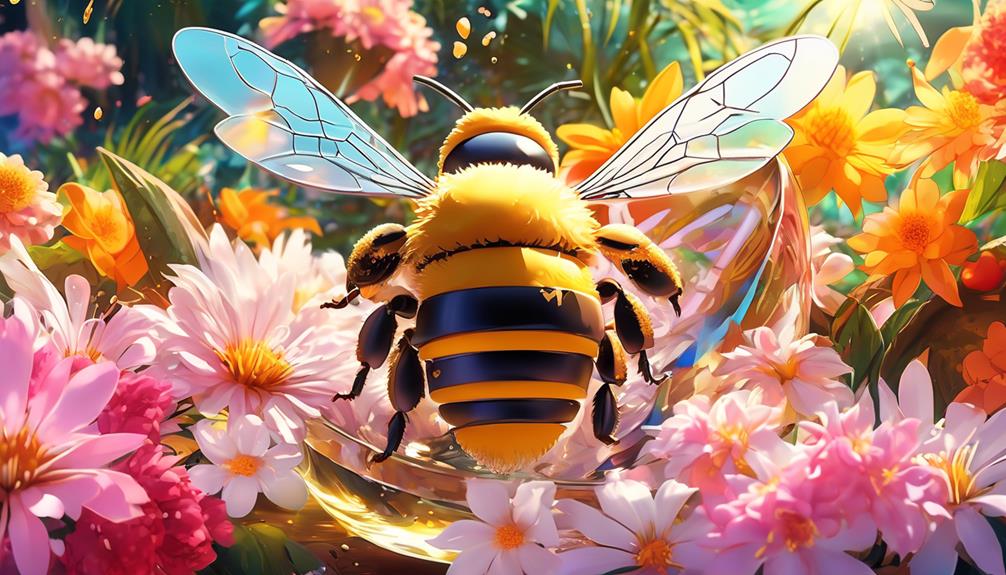
Delving into practical experiences, several case studies provide intriguing insights about bees' interactions with coconut oil.
One of the most notable examples comes from a 2018 study by the Apiculture Research Center. They found that bees exposed to coconut oil showed improved health and increased honey production. The oil's antibacterial properties seem to keep the bees healthier, and it's believed that the increased productivity stems from the oil's effect on the bees' metabolism.
Another study, conducted by the Beekeeping Science Institute in 2020, discovered that coconut oil may deter pests. Honeybees coated with a thin layer of oil were less likely to be targeted by mites, a common bee pest. This could have significant implications for maintaining the health of bee colonies.
Lastly, a case study from a local beekeeping community in Hawaii showed that the use of coconut oil not only enhanced the bees' health but also improved the quality of the honey. They reported that the honey produced had a unique, slightly sweet, and nutty flavor, hinting at the possibility of gourmet honey production using coconut oil.
These cases demonstrate the potential benefits of coconut oil in the beekeeping world.
Future Research on Bees and Coconut Oil
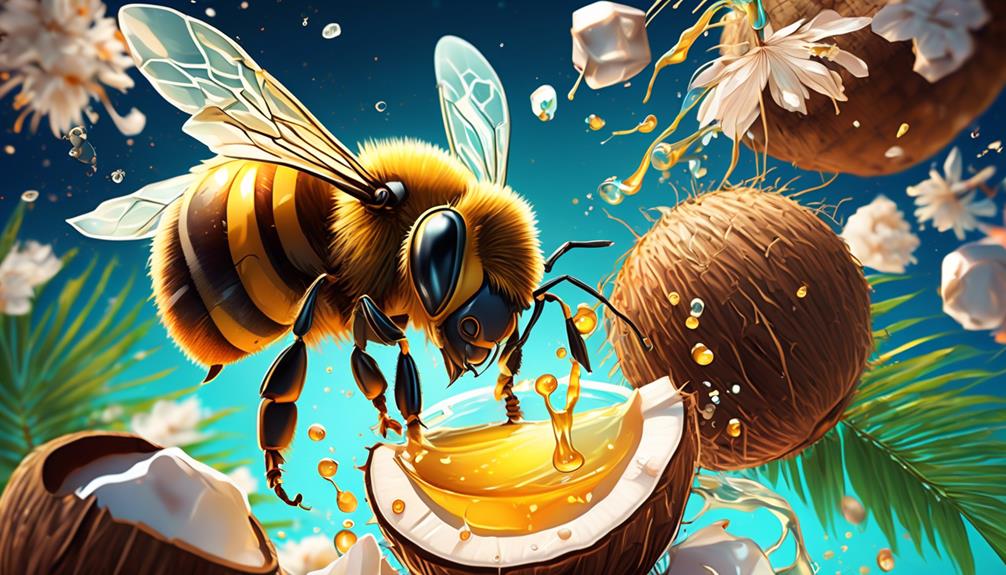
Given the promising results from these case studies, you might be wondering what's next in exploring the potential of coconut oil in apiculture.
There's a need for rigorous scientific research to further understand how bees interact with coconut oil. Specifically, research should focus on determining the precise effects of coconut oil on the bee's overall health and productivity.
When considering the potential benefits and risks, scientists should investigate whether coconut oil positively impacts bee populations by enhancing their resistance to diseases and parasites. There's also the question of whether coconut oil boosts the bees' productivity in honey production.
On the flip side, it's essential to probe into the potential hazards. Could long-term exposure to coconut oil have any adverse effects on bees? Would it influence their foraging behavior or lifespan?
Moreover, the question remains if all types of bees show the same response to coconut oil or if different species exhibit varied reactions. These are just a few areas that future research could delve into.
The knowledge gained will be invaluable in designing sustainable and effective beekeeping practices to safeguard our precious bee populations.
Frequently Asked Questions
How Does Coconut Oil Affect the Lifespan of Bees?
There's no concrete scientific evidence showing how coconut oil specifically impacts a bee's lifespan. It's not a substance they'd naturally encounter, so it could potentially harm them. However, without specific research, we can't definitively say.
What we do know is, bees need a diet of nectar and pollen to thrive. Introducing foreign substances, like coconut oil, may disrupt their natural feeding habits and potentially affect their lifespan negatively.
Can Bees Actually Digest and Metabolize Coconut Oil?
You're curious if bees can digest and metabolize coconut oil. Well, there's no scientific evidence to support this.
Bees mainly digest nectar and pollen, which provide the necessary nutrients for their survival. Coconut oil, being a saturated fat, doesn't fall into their typical diet.
It's important to note introducing foreign substances like coconut oil into a bee's diet could potentially harm them. So, it's best to let bees stick to their natural diet.
Are There Any Specific Types of Bees That Are More Attracted to Coconut Oil?
You're curious about specific types of bees that might be attracted to certain substances. While there's ongoing research on this topic, no particular bee species has been definitively shown to prefer coconut oil.
Bees typically seek out nectar and pollen, not oils. However, every species has unique behaviors, so it's not impossible.
More research is needed to fully understand the potential interactions between bees and coconut oil.
Are There Other Types of Oils That Bees Prefer Over Coconut Oil?
You're curious about whether bees prefer other oils over coconut oil. While there's limited research on this specific topic, bees are generally attracted to sweet scents.
Essential oils like lavender, chamomile, and lemongrass are known to attract bees more than coconut oil does.
It's crucial to remember that these oils should be used cautiously around bees to avoid harming these essential pollinators.
Can the Application of Coconut Oil Harm the Natural Habitat of Bees?
You're correct to worry about any potential harm to bees' habitat. However, there's no clear evidence to suggest that coconut oil specifically damages the natural environments of bees.
It's always important, though, to consider the larger impact of any substance we introduce into ecosystems. Be mindful of how you're using products, even natural ones like coconut oil, to ensure you're not unintentionally causing harm.
Conclusion
So, do bees like coconut oil? Current research suggests not significantly. While some beekeepers use it for mites control, it's not part of a bee's natural diet.
Although certain case studies hint at potential benefits, more comprehensive research is needed. So, even though coconut oil isn't a bee favorite, it might've its place in beekeeping.
Stay tuned for future studies on the intriguing relationship between our buzzing buddies and this tropical oil.

